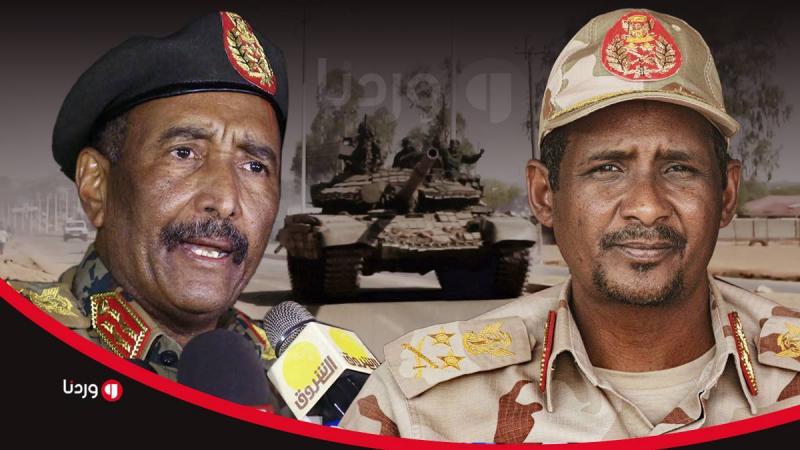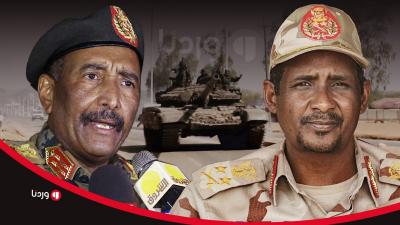After the Sudanese army approved a 24-hour ceasefire starting at 6 PM local time, anticipation remains high in light of past failures of multiple truces, especially since the Rapid Support Forces had previously agreed to it in the afternoon. According to ground reports, there are intermittent and limited gunshots in central Khartoum, while clashes continue around the General Command and the Presidential Palace. Amid the announcement and breach of the ceasefire, Sudanese citizens are enduring tragic circumstances for the fifth day, particularly due to difficulties in accessing food supplies, water, and healthcare services. In an initial tally by the World Health Organization, there are over 300 dead and nearly 2,600 injured. Will the evening ceasefire, which was agreed upon by the Rapid Support Forces, succeed and allow for evacuations and the treatment of the wounded? Notably, the Meroe Airport, which was retaken by the army, underscores the severity of the fighting in recent days, and communications for support forces have been severed. The latter assured that Egyptian soldiers are safe and will be handed over when conditions allow. Consequently, Khartoum is witnessing a displacement movement, exacerbated by scenes of charred bodies and damage to buildings, along with the shifting of battles from downtown to southeastern Khartoum.
The Sudanese Army announced today, Wednesday, its approval of the 24-hour ceasefire aimed at "facilitating humanitarian aspects, provided the other side complies with the ceasefire's terms." The General Command of the Sudanese Armed Forces stated that "rebel elements attacked several sites around the command at dawn today, and the attack was repelled with significant losses inflicted on the enemy." It noted that "the Rapid Support Forces attacked the Republic Guard in the afternoon, and our forces managed to repel it, inflicting heavy losses on the rebels and seizing several medium and light machine guns, personal weapons, and 24 Land Cruisers they left behind."
It clarified that "the Rapid Support Forces looted the central bank branch on Al-Baladiah Street, set it on fire, and our forces pursued them, managing to recover some of the stolen goods, which were substantial amounts of money to be handed over to the bank's presidency." It added that the "Rapid Support Forces have taken control of several government headquarters since the outbreak of the rebellion, including the Council of Ministers, the Ministry of Interior - Civil Registry, and these civilian assets are being used to manage their combat activities. They have also seized a weapons warehouse from police stations and encroached on diplomatic missions."
In contrast, Rapid Support Forces media revealed that "the army continues heavy artillery attacks on our forces' positions, indiscriminately firing shells." On the fifth day, the Rapid Support Forces withdrew from Meroe Airport, leaving substantial damage to buildings and aircraft. The Rapid Support Forces later announced their approval of a 24-hour truce starting at 6 PM today (4:00 PM GMT). In a statement, they said: "We reaffirm our full commitment to a complete ceasefire and hope the other side adheres to the ceasefire according to the announced timing."
Both parties had announced their commitment to a 24-hour ceasefire yesterday, but a Reuters correspondent in Khartoum reported hearing artillery fire from tanks after the ceasefire was supposed to take effect. The sound of heavy gunfire echoed behind live broadcasts from Arab television channels in Khartoum, moments after 6 PM local time (4:00 PM GMT). Warplanes flew over Khartoum, and artillery shelling was heard shortly after the ceasefire began. A resident reported hearing an airstrike in Omdurman, on the opposite bank of the Nile facing Khartoum. Numerous witnesses confirmed that a substantial ground force from the army entered the city from the east. Both the army and Rapid Support Forces exchanged statements accusing each other of violating the ceasefire. The General Command of the Armed Forces stated it would continue its operations to secure the capital and other areas.
In a joint statement, diplomatic missions in Sudan urged the warring forces to cease hostilities and meet their international obligations to protect civilians, diplomats, and humanitarian relief staff. They urged both the army and Rapid Support Forces to avoid further escalation and initiate talks to resolve outstanding issues. The call was made by missions from Canada, France, Germany, Italy, Japan, the Netherlands, Norway, Poland, the Republic of Korea, Spain, Switzerland, Sweden, the United Kingdom, the United States, and the European Union delegation.
The Sudanese Doctors Syndicate announced, "30 civilians have been killed and 245 injured in clashes on Tuesday, despite the ceasefire announcement, raising the total civilian casualties since the outbreak of fighting to 174, with the number of injured at 1,041." It reported that "39 hospitals have ceased operations in Khartoum and adjacent areas of the clashes," stating that "9 of the closed hospitals were bombed, and 16 hospitals faced forced evacuations." It announced the opening of volunteer recruitment to support medical staff in response to increasing military confrontation casualties.
The World Food Programme revealed that "one-third of the population in Sudan faced hunger before this conflict, and violence could plunge millions more into hunger." UN spokesperson Stéphane Dujarric stated in a press briefing in New York, "We have not received any indicators here of fighting ceasing." The conflict erupted between the army's commander and the Rapid Support Forces' leader days ago, disrupting an internationally supported plan to transition to a civilian government following four years of the ousting of Omar al-Bashir's regime after protests.
Lebanon's ambassador to Sudan, Dima Haddad, made an appeal indicating that "the intensity of clashes has escalated, especially near Khartoum Airport, and heavy weapons are being used, causing massive destruction to the airport— and we are all trapped." According to sources in the Lebanese community in Sudan, the building where the Lebanese ambassador lives was shelled.
The Secretary-General of the Arab League, Ahmed Aboul Gheit, called for an "end to the fighting in Sudan and the implementation of a ceasefire during Eid al-Fitr," urging "the armed forces and Rapid Support Forces to announce a ceasefire during the holiday, allowing residents to catch their breath and address urgent humanitarian cases," expressing hope that "my call for a ceasefire during Eid will be met with a receptive ear."
Meanwhile, Libyan Foreign Minister Najla al-Mangoush expressed her country's readiness to mediate between the conflicting parties in Sudan to resume the political process in a phone call with her Sudanese counterpart, Ali al-Sadiq Ali.
The White House condemned, today, the violence that has claimed many lives in Sudan, stating that all American personnel there are safe. White House spokesperson Karine Jean-Pierre informed reporters that estimates suggest the death toll has reached around 270 casualties due to ongoing clashes between the army and Rapid Support Forces for several days.
The French Foreign Ministry urged both parties in the conflict in Sudan to cease hostilities and accept a ceasefire for Eid. UN spokesperson announced that the Secretary-General would participate in a remote meeting regarding Sudan tomorrow, Thursday, with leaders from the African Union, Arab League, and other relevant parties.
UNICEF representative in Sudan Mandyb O'Brien called for "an end to violence," urging "all parties to protect lives." Chad announced that its defense minister stated that his country halted a troop of 320 Sudanese soldiers, saying: "We disarmed them after they entered our territory on Monday."
German Chancellor Olaf Scholz described the situation in Sudan as dangerous for both Sudanese and others, noting that Berlin has a duty to assist in evacuating German citizens and nationals from other countries. During a press conference with Portuguese Prime Minister Antonio Costa, he said, "We feel obligated to consider ways to leave and help accomplish that. If we do something, we will not do it just for ourselves."
According to the German magazine Der Spiegel, "The German army's mission to evacuate about 150 citizens from Sudan was halted today, Wednesday, due to the ongoing fighting in the capital Khartoum." A spokesperson for the German Foreign Ministry stated that Germany is considering all options to protect its citizens in Sudan after the outbreak of fighting there. He added, "We are taking all necessary measures in this difficult situation," pointing out that Berlin was taken by surprise by the intensity of the fighting that erupted between the Sudanese army and Rapid Support Forces on Saturday.
Japan has begun preparations to evacuate its citizens from Sudan, according to Chief Cabinet Secretary Hirokazu Matsuno, stating that "the Ministry of Defense is preparing to evacuate its citizens from Sudan, closely cooperating with the Group of Seven and other major countries," explaining to reporters that "about 60 Japanese nationals are in Sudan, and the government has contacted all of them, and they are safe."
The Indonesian Foreign Ministry called for a "peaceful resolution to the conflict in Sudan," emphasizing that "the priority is the safety and lives of citizens."




